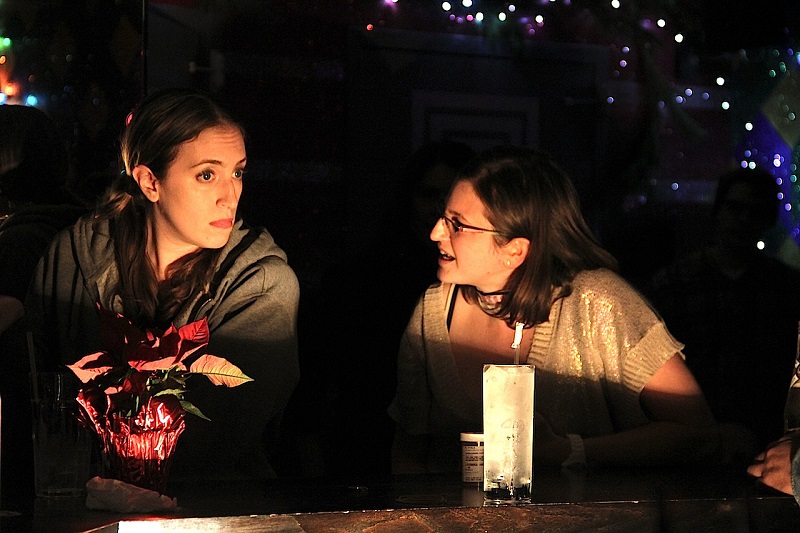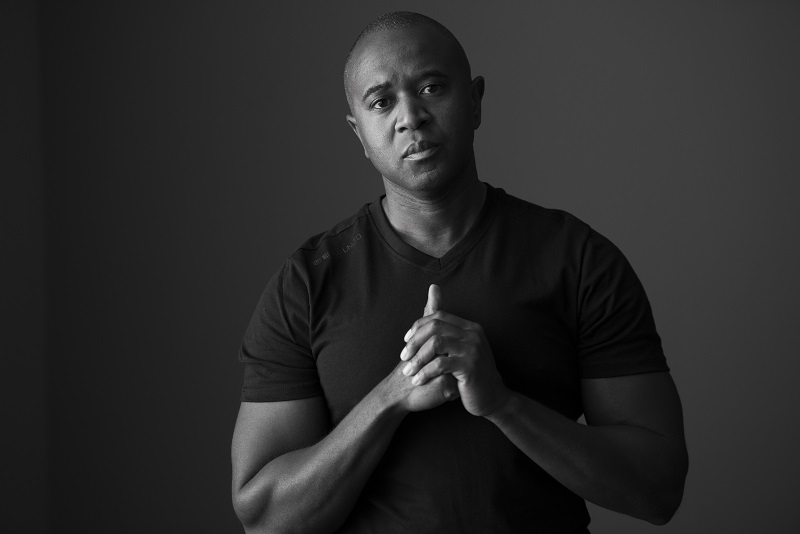
We're back for the second week of the 19-day FRIGID NY Festival, which is in the midst of an artistic occupation of the Kraine Theater and UNDER St. Marks, to discuss two more of its 30 plays. In total, we are reviewing a mere four, or 13%, of this year's FRIGID shows, but information and tickets for all of the offerings can be found at www.FRIGIDnewyork.info. As every year, all proceeds from tickets sales go directly to the artists.
How to Sell Your Gang Rape Baby* *for Parts is the type of comedy whose title probably gives prospective audience members a pretty good idea of whether this sounds like it might be their kind of show. If it does--and we acknowledge that that's a big "if"--then Libby Emmons' irreverent show won't fail to deliver (pun partially intended). Emmons plays Libby alongside Ali Ayala as Ali, a pair of human resources employees each affectionately known to the other as Puss. As they converse at their desk, their conversation turns from talk of whether either of them looks puffy to gossip about intern Bev Ann's gang rape by a football team, which in turns leads to the kind of disagreement about responsibility and expectations of safety that inevitably surround such events. When it transpires that "life-affirming," conservative Bev Ann is pregnant as a result of the rape, Libby, Ali, and their boss Peter, who is transitioning, all want to convince Bev Ann what the fate of her fetus should be. Libby and Ali's motives are somewhat less than altruistic, but their plans to profit from the situation are derailed when Bev Ann is harmed by yet another man.
Along the way, the pair of Pusses, when not concerned with the cheapness of human life or the racism inherent in the adoption market, touch on various facets of the ways that power, control, blame, and expectations relate to gender. They question what actually constitutes being a woman, for example, or debate getting "fem-tenderization surgery" in order to, in Libby's formulation, not just be a woman but look like one--to meet the same standard, in other words, as their co-worker's sex doll-wife, or even as their surgically enhanced boss.
Libby and Ali's debating and scheming are performed in a hilariously deadpan cascade that belies their absurdism. Small touches like Ali's Nasty Woman workout shirt and Libby's quiet passion for Cheetos Puffs or her blowing the dust out of the bottom of a mug of pens in order to share a belt of whiskey at their workstation both ground and heighten the comedy. We would have been more than happy to spend much longer with these two characters, and we look forward to what puss&puss has to offer next. No matter your position on black-market baby parts, we can't recommend this show more strongly.

In the opening section of his one-man show, BLACK!, Michael Washington Brown asks us to consider the power of language. Words, he points out, can comfort, or they can harm, and one might delve into the depth and breadth of meaning packed into a word like Black, even while questioning whether, when looked at another way, it means anything at all. Brown's show approaches these questions by dramatizing lived experience, presenting a trio of characters introduced by the person who asked them to address the question--think of them as guest speakers at a lecture, if you will. These speakers put forward a global range of perspectives and voices -- South African, American, English, and Jamaican. Brown plays them all, transforming easily while keeping these individuals distinct. The multinational diversity is appreciated, as conversations on race, as on many issues, tend in the U.S. towards insularity. None of the viewpoints represented in the show, even that of the presenter, should be taken as direct stand-ins for that of the playwright; rather, they are placed into dialogue with one another and, thus, with the audience as well.
Early on in this dialogue, one character admits that Black life is complicated but posits that it is complicated because the world itself is complicated, and people's choices make it moreso, and thereby more divisive. A music lover, he connects color to the positive force of music, seeing different shades for different genres. He also discusses the experience of the change from "Black" to "African-American" as an identifier, and criticizes some Black people for shunning others when they think that they are better than them. A second character, in the middle and most thought-provoking section, similarly critiques the Black community in London for the way that its successful members abandon or compete with the others rather than helping them, as he says he sees going on in other, immigrant and minority communities. This observation leads him to wonder is the strategies to keep slaves under control by sowing distrust among them are still resonating in some way today. Relatedly, he notes how the word Black has become associated with struggle, for good or ill, and touches on how, in all of this context, people end up asking themselves if they are Black enough or too Black. A third character focuses on family, both blood relatives and an expanded conception that includes people in the community as well. He champions strict parenting, school uniforms, and avoiding social media, but still cannot insulate his daughter from experiences such as learning about slavery at school, which causes her to assume that the enslaved must have been undergoing punishment for being bad people. He also rattles off an extensive list of examples of how, in Western culture, most metaphorical uses of white signify good and black signifies bad, such as the dove being a sign of peace and the raven of evil, even though ravens are very intelligent birds.
The ending frame brings some of the central ideas of the show into relief, including that it is important to see life from different perspectives, even if you don't agree with them, because your own lived reality may not be shared by everyone. One of the views that echoes through all of the perspectives in BLACK! is the importance of brotherhood and unity, that we are all people, regardless of color or shade of color. There are a lot of jokes in the show, but it is earnest at heart, a call to consider how you will improve the world by existing in it. The appeals to love one another and to universalism may strike the more cynical or jaded as too simple or as politically naive, but at least one of the characters would argue that that is part of the problem in the first place. - Leah Richards & John Ziegler
